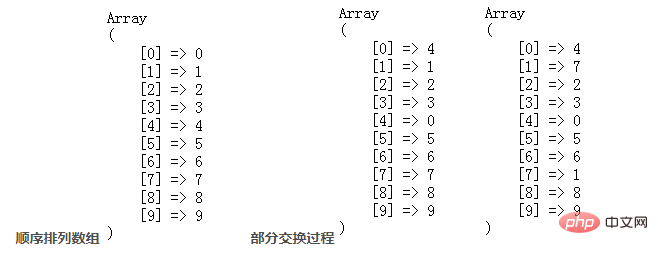How to generate non-repeating random numbers in php
How to generate non-repeating random numbers in php: first assign a value to each number in the array in order of its subscript; then start to take random numbers in the range of "[i, $num-1]"; finally, in Just perform alternating operations on the unchanged key-value pairs.

Recommended: "PHP Video Tutorial"
PHP efficiently generates a non-repeating random number
PHP generates a non-repeating random array encapsulation method
/*
* array unique_rand( int $min, int $max, int $num )
* 生成一定数量的不重复随机数
* $min 和 $max: 指定随机数的范围
* $num: 指定生成数量
*/
function unique_rand($min, $max, $num) {
//初始化变量为0
$count = 0;
//建一个新数组
$return = array();
while ($count < $num) {
//在一定范围内随机生成一个数放入数组中
$return[] = mt_rand($min, $max);
//去除数组中的重复值用了“翻翻法”,就是用array_flip()把数组的key和value交换两次。这种做法比用 array_unique() 快得多。
$return = array_flip(array_flip($return));
//将数组的数量存入变量count中
$count = count($return);
}
//为数组赋予新的键名
shuffle($return);
return $return;
}This method obtains random numbers each time and stores them in the array before deduplicating...it is inefficient. ..I don’t want to use
PHP to efficiently generate m non-repeating random numbers in the n range (m<=n)
Note: It is also mentioned in the book "Programming Pearls", the title For "How to efficiently generate m non-repeating random numbers in the range of n (m<=n)"
This algorithm is very clever in taking the position of the random number (the subscript of the array), instead of taking the random number itself , every time a random number is obtained, it will be excluded from the value range, and next time it will only be taken from the remaining numbers. The random number selection can be completed in one traversal, which is quite efficient.
function rand_num($num='200'){
for($i=0;$i<$num;$i++){
$n[$i] = $i;
}
for($i=0;$i<$num;$i++){
$rand = mt_rand($i,$num-1);
//数组 随机数交换下标
if($n[$i] == $i){
$n[$i] = $n[$rand];
$n[$rand] = $i;
}
}
}1. The first step is to assign a value to each number in the array in the order of its subscript, and obtain an array of $num numeric key values arranged in corresponding order.
2. In the second step, start taking the random number $rand in the range [i, $num-1], and use the obtained random number $rand as the subscript corresponding to the current position key i in the array Value $rand, replace the value corresponding to the subscript of key $rand in the array with i. This is actually a cross-exchange of array key values. The meaning is to exclude the generated random number from the value range [i,$num-1], and next time it will take the value from the remaining numbers [i 1,num-1].
3. In the third step, in order to avoid repeated values, only perform alternating operations on the unchanged key-value pairs, that is, perform alternating operations on the positions where the original array is arranged sequentially (key == value).
4. End.
Sequential array partial exchange process

As shown above, obtain 10 random number partial examples.
The above is the detailed content of How to generate non-repeating random numbers in php. For more information, please follow other related articles on the PHP Chinese website!

Hot AI Tools

Undresser.AI Undress
AI-powered app for creating realistic nude photos

AI Clothes Remover
Online AI tool for removing clothes from photos.

Undress AI Tool
Undress images for free

Clothoff.io
AI clothes remover

Video Face Swap
Swap faces in any video effortlessly with our completely free AI face swap tool!

Hot Article

Hot Tools

Notepad++7.3.1
Easy-to-use and free code editor

SublimeText3 Chinese version
Chinese version, very easy to use

Zend Studio 13.0.1
Powerful PHP integrated development environment

Dreamweaver CS6
Visual web development tools

SublimeText3 Mac version
God-level code editing software (SublimeText3)

Hot Topics
 1387
1387
 52
52
 PHP 8.4 Installation and Upgrade guide for Ubuntu and Debian
Dec 24, 2024 pm 04:42 PM
PHP 8.4 Installation and Upgrade guide for Ubuntu and Debian
Dec 24, 2024 pm 04:42 PM
PHP 8.4 brings several new features, security improvements, and performance improvements with healthy amounts of feature deprecations and removals. This guide explains how to install PHP 8.4 or upgrade to PHP 8.4 on Ubuntu, Debian, or their derivati
 7 PHP Functions I Regret I Didn't Know Before
Nov 13, 2024 am 09:42 AM
7 PHP Functions I Regret I Didn't Know Before
Nov 13, 2024 am 09:42 AM
If you are an experienced PHP developer, you might have the feeling that you’ve been there and done that already.You have developed a significant number of applications, debugged millions of lines of code, and tweaked a bunch of scripts to achieve op
 How To Set Up Visual Studio Code (VS Code) for PHP Development
Dec 20, 2024 am 11:31 AM
How To Set Up Visual Studio Code (VS Code) for PHP Development
Dec 20, 2024 am 11:31 AM
Visual Studio Code, also known as VS Code, is a free source code editor — or integrated development environment (IDE) — available for all major operating systems. With a large collection of extensions for many programming languages, VS Code can be c
 Explain JSON Web Tokens (JWT) and their use case in PHP APIs.
Apr 05, 2025 am 12:04 AM
Explain JSON Web Tokens (JWT) and their use case in PHP APIs.
Apr 05, 2025 am 12:04 AM
JWT is an open standard based on JSON, used to securely transmit information between parties, mainly for identity authentication and information exchange. 1. JWT consists of three parts: Header, Payload and Signature. 2. The working principle of JWT includes three steps: generating JWT, verifying JWT and parsing Payload. 3. When using JWT for authentication in PHP, JWT can be generated and verified, and user role and permission information can be included in advanced usage. 4. Common errors include signature verification failure, token expiration, and payload oversized. Debugging skills include using debugging tools and logging. 5. Performance optimization and best practices include using appropriate signature algorithms, setting validity periods reasonably,
 How do you parse and process HTML/XML in PHP?
Feb 07, 2025 am 11:57 AM
How do you parse and process HTML/XML in PHP?
Feb 07, 2025 am 11:57 AM
This tutorial demonstrates how to efficiently process XML documents using PHP. XML (eXtensible Markup Language) is a versatile text-based markup language designed for both human readability and machine parsing. It's commonly used for data storage an
 PHP Program to Count Vowels in a String
Feb 07, 2025 pm 12:12 PM
PHP Program to Count Vowels in a String
Feb 07, 2025 pm 12:12 PM
A string is a sequence of characters, including letters, numbers, and symbols. This tutorial will learn how to calculate the number of vowels in a given string in PHP using different methods. The vowels in English are a, e, i, o, u, and they can be uppercase or lowercase. What is a vowel? Vowels are alphabetic characters that represent a specific pronunciation. There are five vowels in English, including uppercase and lowercase: a, e, i, o, u Example 1 Input: String = "Tutorialspoint" Output: 6 explain The vowels in the string "Tutorialspoint" are u, o, i, a, o, i. There are 6 yuan in total
 Explain late static binding in PHP (static::).
Apr 03, 2025 am 12:04 AM
Explain late static binding in PHP (static::).
Apr 03, 2025 am 12:04 AM
Static binding (static::) implements late static binding (LSB) in PHP, allowing calling classes to be referenced in static contexts rather than defining classes. 1) The parsing process is performed at runtime, 2) Look up the call class in the inheritance relationship, 3) It may bring performance overhead.
 What are PHP magic methods (__construct, __destruct, __call, __get, __set, etc.) and provide use cases?
Apr 03, 2025 am 12:03 AM
What are PHP magic methods (__construct, __destruct, __call, __get, __set, etc.) and provide use cases?
Apr 03, 2025 am 12:03 AM
What are the magic methods of PHP? PHP's magic methods include: 1.\_\_construct, used to initialize objects; 2.\_\_destruct, used to clean up resources; 3.\_\_call, handle non-existent method calls; 4.\_\_get, implement dynamic attribute access; 5.\_\_set, implement dynamic attribute settings. These methods are automatically called in certain situations, improving code flexibility and efficiency.




